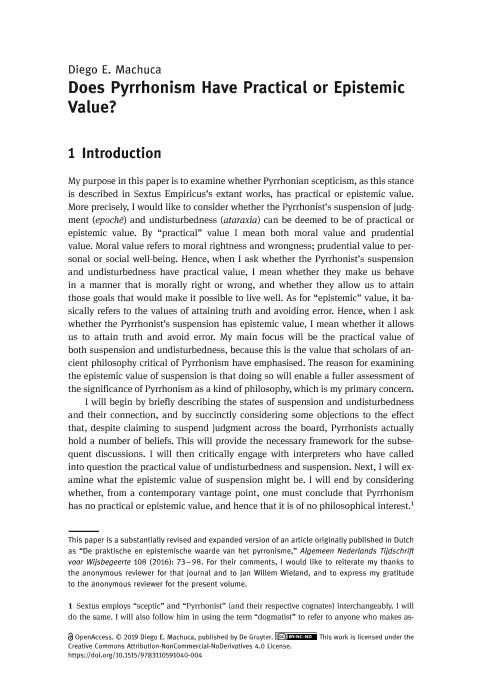Mostrar el registro sencillo del ítem
dc.contributor.author
Machuca, Diego Emanuel

dc.contributor.other
Veltri, Giuseppe
dc.contributor.other
Haliva, Racheli
dc.contributor.other
Schmid, Stephan
dc.contributor.other
Spinelli, Emidio
dc.date.available
2020-11-11T12:46:08Z
dc.date.issued
2019
dc.identifier.citation
Machuca, Diego Emanuel; Does Pyrrhonism Have Practical or Epistemic Value?; De Gruyter; 6; 2019; 43-66
dc.identifier.isbn
978-3-11-059104-0
dc.identifier.uri
http://hdl.handle.net/11336/118112
dc.description.abstract
My purpose in this paper is to examine whether Pyrrhonian scepticism, as this stance is described in Sextus Empiricus?s extant works, has practical or epistemic value. More precisely, I would like to consider whether the Pyrrhonist?s suspension of judgment (epochē) and undisturbedness (ataraxia) can be deemed to be of practical or epistemic value. By ?practical? value I mean both moral value and prudential value. Moral value refers to moral rightness and wrongness; prudential value to personal or social well-being. Hence, when I ask whether the Pyrrhonist?s suspension and undisturbedness have practical value, I mean whether they make us behave in a manner that is morally right or wrong, and whether they allow us to attain those goals that would make it possible to live well. As for ?epistemic? value, it refers basically to the values of attaining truth and avoiding error. Hence, when I ask whether the Pyrrhonist?s suspension has epistemic value, I mean whether it allows us to attain truth and avoid error. My main focus will be the practical value of both suspension and undisturbedness because this is the value on which ancient philosophy scholars critical of Pyrrhonism have laid emphasis. The reason for examining the epistemic value of suspension is that doing so will enable a fuller assessment of the significance of Pyrrhonism as a kind of philosophy, which is my primary concern.
dc.format
application/pdf
dc.language.iso
eng
dc.publisher
De Gruyter

dc.rights
info:eu-repo/semantics/openAccess
dc.rights.uri
https://creativecommons.org/licenses/by-nc-sa/2.5/ar/
dc.subject
PYRRHONISM
dc.subject
PRACTICAL VALUE
dc.subject
EPISTEMIC VALUE
dc.subject
UNDISTURBEDNESS
dc.subject.classification
Otras Filosofía, Étnica y Religión

dc.subject.classification
Filosofía, Ética y Religión

dc.subject.classification
HUMANIDADES

dc.title
Does Pyrrhonism Have Practical or Epistemic Value?
dc.type
info:eu-repo/semantics/publishedVersion
dc.type
info:eu-repo/semantics/bookPart
dc.type
info:ar-repo/semantics/parte de libro
dc.date.updated
2020-11-09T19:23:07Z
dc.journal.volume
6
dc.journal.pagination
43-66
dc.journal.pais
Alemania

dc.journal.ciudad
Berlin
dc.description.fil
Fil: Machuca, Diego Emanuel. Consejo Nacional de Investigaciones Científicas y Técnicas; Argentina
dc.relation.alternativeid
info:eu-repo/semantics/altIdentifier/url/https://www.degruyter.com/view/title/537014
dc.conicet.paginas
230
dc.source.titulo
Sceptical Paths: Enquiry and Doubt from Antiquity to the Present
Archivos asociados
